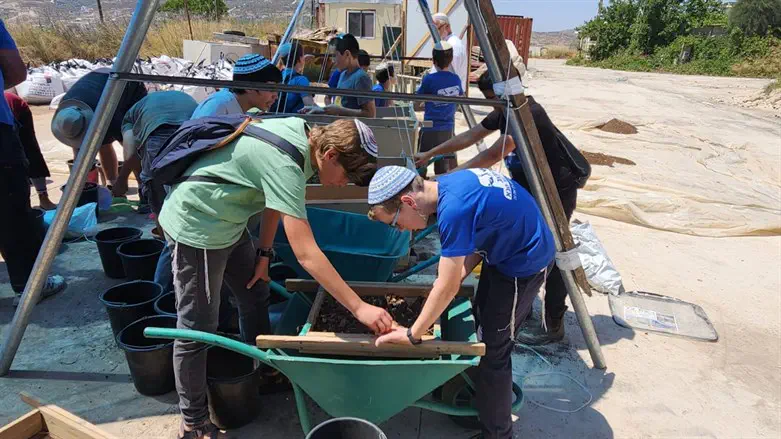
The Samaria Regional Council will for the first time hold the traditional Samaria march to the biblical altar of Joshua.
The march will take place on the second day of Sukkot. Also, for the first time, the general public will be able to come and participate in the project of sifting the dirt from the altar on the following day to search for archaeological findings.
The sifting of the dirt began about a year ago, by the Council in cooperation with the "Association for Biblical Research," and Dr. Scott Stripling from the United States, under the direction of archaeologist Dr. Avi Solomon. The screening project is taking place in the town of Shavei Shomron, in cooperation with the Samaria Tour and Study Center, which makes it available to high schools and families.
The project has so far found an artifact that the researchers speculate is an ancient ring from the settlement period, which may have belonged to one of the women who participated in the Biblical blessing and cursing ceremony described in Deuteronomy 3,200 years ago, beads that may have belonged to children or women's jewelry from that period, a jug with a collar rim characteristic of the settlement period from the days of Joshua, and parts of plaster that may have been used to cover the "great stones" upon which the Bible was inscribed.
The sifting of the dirt takes place against the backdrop of attempts by the Palestinian Authority to destroy the site of the ancient altar. A year ago, stones were removed from the site of the altar, and now the Palestinian Authority is working to build a neighborhood on the site of the altar, and even began earthmoving work near the altar. That activity was stopped just before the stones of the site were demolished. The Palestinian Authority is also promoting an activity that will define the altar as a Palestinian heritage site.
Yossi Dagan, head of the Samaria Council, said, "The findings from the site of the altar are further proof of the inextricable connection between the people of Israel and its country and certainly Samaria, and proves the importance of the site for knowing our roots and the Jewish people for generations. Precisely now in the face of the Palestinian Authority's attempt to destroy Joshua's altar, the people of Israel will be there with the Israeli flag - to connect to the roots and values."
"I call on the public to come and discover the history of the people of Israel with their own hands. To walk with us to the ancient Altar of Joshua, a unique relic of the settlement period and the return of the people of Israel to their land, and of course enjoy the multitude of heritage sites, tourism, nature, wineries, and springs all over Samaria."
Archaeologist Dr. Avi Solomon added: "It is a privilege to work at the Mount Ebal site which is identified as Joshua's Altar, which is the place where the people of Israel became a people approximately 3,200 years ago. After we were exiled from our land, after 2,000 years, we can return and touch our roots, in the place where we became a people, to know that we are touching objects and actually touching our past. This place is important like no other, it is a unique place - of all the archaeological finds in the Land of Israel, this place is identified with the foundation of the people of Israel as a people and not as tribes, and its importance to the archaeological world for the people of Israel and for humanity as a whole is priceless."

